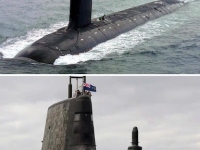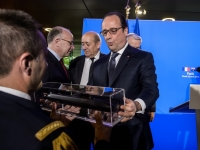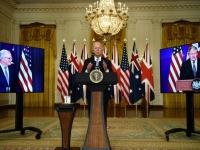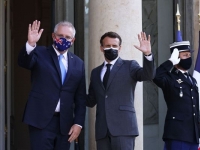Politics
FRENCH FOREIGN MIN. LE DRIAN SAID HE IS ANGRY AFTER THE STABBED IN THE BACK
BY AUSTRALIA OVER €50 Bn SUBMARINE DEAL
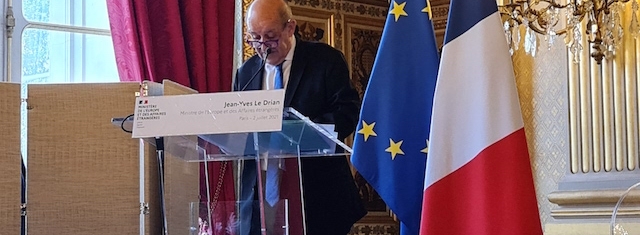
French Foreign Minister Jean Yves Le Drian (Source: Jedi Foster & Rahma Sophia Rachdi)
USPA NEWS -
Australia has scrapped the submarine ’s deal so called in France the « Contract of the century" of more than 50 billion €, (signed in 2016, under the mandate of Francois Hollande) with France, by canceling the order for 12 submarines for the benefit of American and British nuclear technologies. Foreign Minister Jean-Yves Le Drian (who was Minister of Defense in 2016, when the Franco-Australian contract was signed) "It's really a stab in the back. We had established a relationship of trust with Australia, this trust has been betrayed, ‘I’m very angry today, and bitter... this is not something allies do to each other,’ he "told France Info radio. Indeed, the three American leaders, President Joe Biden, Australian Prime Minister Scott Morrison and British Prime Minister Boris Johnson, held a virtual meeting, via screens, on September 15 in the afternoon, to announce the creation of a new trilateral security partnership between our three nations focused on the Indo-Pacific region, Un “pas historique” according to the American President Joe Biden.
JEAN YVES LE DRIAN SAID « HE IS ANGRY AND BITTER » AFTER THE STABBED IN THE BACK BY AUSTRALIA OVER SUBMARINE DEAL-------------------------------------------------------------------------------------------------
France on Thursday accused President Biden of making an "unpredictable decision" like President Trump "used to do" after he scrapped a $40 billion submarine defense deal that the European nation had signed with Australia, according to Reuters."This brutal, unilateral and unpredictable decision reminds me a lot of what Mr. Trump used to do," French Foreign Minister Jean-Yves Le Drian told france info radio. "I am angry and bitter. This isn't done between allies." He added "This unilateral, sudden and unforeseeable decision very much recalls what Mr. Trump would do, French Foreign Minister Jean Yves Le Drian describe what has happened as "unacceptable" and "incomprehensible."-----------------------------------------------
Indeed, this agreement effectively breaks the “contract of the century” which had been signed between Australia and the French Naval Group (Ex DCNS) located in Cherbourg, Normandy, in 2016, and which was to bind the two countries for fifty years.In a press release, the Minister of the Armed Forces, Florence Parly, notably castigated this “American choice” which separates France from Australia while “unprecedented challenges arise in the Indo-Pacific zone”.However, the United States, after their definite departure from Afghanistan, under the new Biden administration, refocused their strategic priorities on this Indo-Pacific zone and on their duel with China considered a "threat", hence the rapprochement of the United States. historical wings US-UK-AUSTRALIA…
THE SCRAPPED SUBMARINE DEAL CALLED « CONTRACT OF THE CENTURY » WAS WORTH €31BILLION
Naval Group, a French company, partly owned by the French state, (ex DCNS), located in Cherbourg, (Normandy), had been chosen to build 12 conventionally powered submarines for Australia, based on France's Barracuda nuclear-powered subs in development.The contract was worth around 50 billion Australian dollars (€31 billion, $36.5 billion) when announced in 2016, during Francois Hollande’s term. Now that, the new U.S President Joe Biden announced a new trilateral US security alliance with Australia and Britain on Wednesday, that would develop an Australian nuclear-powered submarine fleet. That will furnish Australia with new nuclear-powered submarines, at the expense of the French who previously signed a huge deal…Australian Prime Minister Scott Morrison, who paid two visits in France, welcomed by President Emmanuel Macron at Elysee Palace, said he told the French head of State last June that there were “very real issues about whether a conventional submarine capability” would address Australia’s strategic security needs in the Indo-Pacific. “Of course they’re disappointed,” Morrison said. "They've been good partners. This is about our strategic interest, our strategic capability requirements and a changed strategic environment and we’ve had to take that decision.” On the other hand, President Macron, who visited French Polynesia an archipelago of more than 100 islands, for a four day-stay, addressed the consequences of the 193 nuclear tests France conducted on the atolls of Moruroa and Fangataufa from 1966 to 1996. Many developed cancer in the years after the tests were conducted and are hoping for a meaningful gesture from Macron as they struggle to secure compensation. (Source: france 24)
FRANCE AND EU COMPLAINED OF NOT INFORMED ON AUKUS ALLIANCE----------------------------------------------
France complained that it was kept out of the loop on the AUKUS partnership, ahead of the announcement by the USA. The Australia-UK-US alliance – dubbed AUKUS – announcement came just before the EU was scheduled to detail its own Indo-Pacific strategy on Thursday."The AUKUS security partnership further demonstrates the need for a common EU approach in a region of strategic interest," European Council chief Charles Michel wrote on Twitter, adding that EU leaders would discuss it at a meeting in October.
BARRY PEVEL SENIOR VP & DIRECTOR OF THE SCOWCROFT CENTER FOR STRATEGY & SECURITY AT THE ATLANTIC COUNCIL TALKS ABOUT A « NEW LEVEL OF DETERRENCE AGAINST CHINA »--------------------------
« The AUKUS alliance initiative, which I heartily applaud as one of many that will be required in the coming years to keep pace with Chinese advances, will have manifold implications as it continues to play out. The Biden administration is taking an important step to build a key alliance element of the edifice required for the new era.----------------------------------------------
First, it will have geostrategic implications, as it tangibly strengthens the closest alliance relationships that the United States shares with allies in both the Indo-Pacific and Europe—the United Kingdom and Australia in particular. A major signal from this alliance initiative, the “AUKUS alliance,” of which China will take note, is that a European ally of the United States is joining an Indo-Pacific ally of the United States in working together to develop undersea capabilities and to patrol the seas of the Pacific, and doing so through cooperation around one of the most sensitive combat systems in modern inventories. This signals to China that European allies take China’s ongoing coercive military operations in the western Pacific (for example, against Taiwan and in the South China Sea) as seriously as do America’s Indo-Pacific allies.---------------------------------------
Second, it will have particularly constructive operational military implications, strengthening the ability of the United States-led alliances to deter Chinese military coercion even as Chinese capabilities continue to develop rapidly. Undersea capabilities are critical for preventing the Chinese military from achieving its operational objectives in the most important likely contingencies in the region. A key parameter of this new trilateral alliance will include US submarine access to Australian support infrastructure, thereby strengthening the overall US and allied increasingly “latticed” global defense posture (more of which will emerge after the National Defense Strategy review is completed). In addition, this initiative will also further strengthen the already close defense industrial cooperation among the United States, Australia, and the United Kingdom on some of the key technologies that will be of highest importance for future military effectiveness, including artificial intelligence, cyber, and long-range precision strike capabilities.----------------------------------------------------------------
Those critics who say that China will react and that this will lead to a new arms race are missing the big picture: There is a decades-long trend that has only accelerated under Xi Jinping in which China has been developing high-tech, leading-edge advanced military capabilities across the board. The parameters of likely military contingencies in the Indo-Pacific suggest that the United States and US allies have a lot of work to do in order to buttress a weakening deterrent posture in the context of rapid Chinese People’s Liberation Army advances. This is one small but important step in doing just that.---------------------
The interesting echo of history that this initiative represents harkens back to the Eisenhower administration’s policy of sharing nuclear technology with the UK, a policy that caused French President Charles de Gaulle to decry the “Anglo-Saxon” nuclear cooperation and propelled France to develop its own nuclear capabilities. In light of the broad set of strategic challenges that China’s continuing rise presents to the breadth of US alliances, it would be wise for the Biden administration to follow up this set of steps by developing analogous cooperative efforts with France, Japan, South Korea, and other leading allies. » Source: —Barry Pavel is senior vice president and director of the Scowcroft Center for Strategy and Security at the Atlantic Council and former top US Defense Department and National Security Council official.
Submarines Naval Australia Uk Pm Boris Johnson Us President Joe Biden Rahma Sophia Rachdi Jedi Foster
Liability for this article lies with the author, who also holds the copyright. Editorial content from USPA may be quoted on other websites as long as the quote comprises no more than 5% of the entire text, is marked as such and the source is named (via hyperlink).

